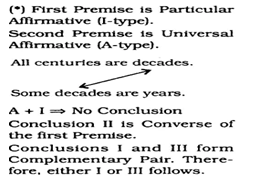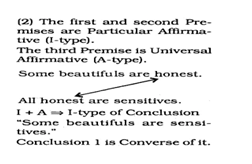Digitization help student to explore and study their academic courses online, as this gives them flexibility and scheduling their learning at their convenience. Kidsfront has prepared unique course material of General Intelligence & Reasoning Statement & Course of Action for SBI PO Exam student. This free online General Intelligence & Reasoning study material for SBI PO Exam will help students in learning and doing practice on Statement & Course of Action topic of SBI PO Exam General Intelligence & Reasoning. The study material on Statement & Course of Action, help SBI PO Exam General Intelligence & Reasoning students to learn every aspect of Statement & Course of Action and prepare themselves for exams by doing online test exercise for Statement & Course of Action, as their study progresses in class. Kidsfront provide unique pattern of learning General Intelligence & Reasoning with free online comprehensive study material and loads of SBI PO Exam General Intelligence & Reasoning Statement & Course of Action exercise prepared by the highly professionals team. Students can understand Statement & Course of Action concept easily and consolidate their learning by doing practice test on Statement & Course of Action regularly till they excel in General Intelligence & Reasoning Statement & Course of Action.
 Statement is given followed by two inferences I and II. You have to consider the statement to be true even if it seems to be at variance from commonly known facts. You have to decide which of the given inferences, if any. follow from the given statement.
Statement is given followed by two inferences I and II. You have to consider the statement to be true even if it seems to be at variance from commonly known facts. You have to decide which of the given inferences, if any. follow from the given statement.
 Correct Answer Is : Only inference I follows
Correct Answer Is : Only inference I follows Select the alternative inference which is most appropriate. “Ail professors are learned; learned people are always gentle.”
Select the alternative inference which is most appropriate. “Ail professors are learned; learned people are always gentle.”
 Correct Answer Is : The inference is true
Correct Answer Is : The inference is true In each of the following questions, one/ two statements are given followed by two conclusions/ assumptions, I and II. You have to consider the staements to be true, even if they seen to be at variance from commonly known facts. You are to decide which of the given conclusions/ assumptions can definitely be drawn from the given statements. Indicate your answer.
In each of the following questions, one/ two statements are given followed by two conclusions/ assumptions, I and II. You have to consider the staements to be true, even if they seen to be at variance from commonly known facts. You are to decide which of the given conclusions/ assumptions can definitely be drawn from the given statements. Indicate your answer. Correct Answer Is : Only conclusion I follows
Correct Answer Is : Only conclusion I follows In each of the following questions, one/ two statements are given followed by two conclusions/ assumptions, I and II. You have to consider the staements to be true, even if they seen to be at variance from commonly known facts. You are to decide which of the given conclusions/ assumptions can definitely be drawn from the given statements. Indicate your answer.
In each of the following questions, one/ two statements are given followed by two conclusions/ assumptions, I and II. You have to consider the staements to be true, even if they seen to be at variance from commonly known facts. You are to decide which of the given conclusions/ assumptions can definitely be drawn from the given statements. Indicate your answer. Correct Answer Is : Only I is implicit
Correct Answer Is : Only I is implicit In each of the following questions, one/two statements are given, followed by two/three conclusions I, II and III. You have to consider the statements to be true even if they seem to be at
variance from commonly known facts. You have to decide which of the given conclusions, if any, follow from the given statements.
In each of the following questions, one/two statements are given, followed by two/three conclusions I, II and III. You have to consider the statements to be true even if they seem to be at
variance from commonly known facts. You have to decide which of the given conclusions, if any, follow from the given statements. Correct Answer Is : Only conclusions
I and III follow
Correct Answer Is : Only conclusions
I and III follow
 In each of the following questions, one/two statements are given, followed by two/three conclusions I, II and III. You have to consider the statements to be true even if they seem to be at
variance from commonly known facts. You have to decide which of the given conclusions, if any, follow from the given statements.
In each of the following questions, one/two statements are given, followed by two/three conclusions I, II and III. You have to consider the statements to be true even if they seem to be at
variance from commonly known facts. You have to decide which of the given conclusions, if any, follow from the given statements. Correct Answer Is : Only conclusion
I follows
Correct Answer Is : Only conclusion
I follows In each of the following questions, one/two statements are given followed by three conclusions. You have to consider the statements to be true even it they seem to be at variance from commonly known facts. You have to
decide which of the given conclusions, if any, follow from the given statements.
In each of the following questions, one/two statements are given followed by three conclusions. You have to consider the statements to be true even it they seem to be at variance from commonly known facts. You have to
decide which of the given conclusions, if any, follow from the given statements.  Correct Answer Is : Both conclusions 1 and 3 follow.
Correct Answer Is : Both conclusions 1 and 3 follow. In each of the following questions, one/two statements are given followed by three conclusions. You have to consider the statements to be true even it they seem to be at variance from commonly known facts. You have to
decide which of the given conclusions, if any, follow from the given statements.
In each of the following questions, one/two statements are given followed by three conclusions. You have to consider the statements to be true even it they seem to be at variance from commonly known facts. You have to
decide which of the given conclusions, if any, follow from the given statements.  Correct Answer Is : Only Conclusion 1 follows
Correct Answer Is : Only Conclusion 1 follows
 In the following questions, two statements are given
followed by two conclusions I and II. You have to consider the two statements to be
true even if they seem to be at variance from commonly known facts. You have to
decide which of the given conclusions, if any, follow from the given tatements.
In the following questions, two statements are given
followed by two conclusions I and II. You have to consider the two statements to be
true even if they seem to be at variance from commonly known facts. You have to
decide which of the given conclusions, if any, follow from the given tatements. Correct Answer Is : Conclusion I and II follows
Correct Answer Is : Conclusion I and II follows In the following questions, two statements are given followed by two conclusions I and II. You have to consider the two statements to be
true even if they seem to be at variance from commonly known facts. You have to decide which of the given conclusions, if any, follow from the given statements.
In the following questions, two statements are given followed by two conclusions I and II. You have to consider the two statements to be
true even if they seem to be at variance from commonly known facts. You have to decide which of the given conclusions, if any, follow from the given statements. Correct Answer Is : None of them
Correct Answer Is : None of them